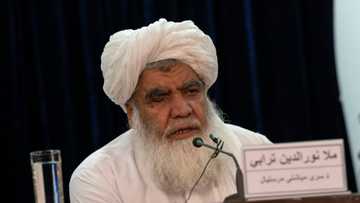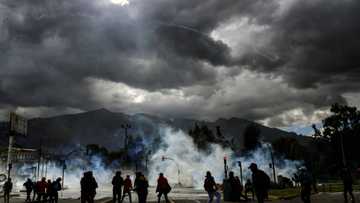Nigeria oil hub community in fight over waterfront home

Source: AFP
PAY ATTENTION: Click “See First” under the “Following” tab to see Legit.ng News on your Facebook News Feed!
Acres of slums line the creeks of Nigeria's oil hub Port Harcourt, home to tight-knit communities with a population density more than twice that of Manhattan.
The tangle of 50 self-built waterfront settlements made of concrete, wood and corrugated sheets hosts half a million people, many reliant on the polluted creeks for their livelihoods.
Port Harcourt's communities are now caught in a battle over their informal homes after Rivers State Governor Ezenwo Nyesom Wike ordered all the settlements to be demolished.
Wike and Rivers officials have described them as "dens of criminals" that needed cleaning up, offering no compensation for the homes destroyed and no development plan for the land.
Many residents lived there for decades. Their parents and grandparents built the land, filling the creeks with fibrous black mud cut from the mangroves.
Since the demolitions began in January, half of the Diobu settlement in the southwest of the city has been destroyed.
PAY ATTENTION: Join Legit.ng Telegram channel! Never miss important updates!
Up to 22,000 residents were made homeless in six days. Where there was a thriving community now sits 11 hectares of rubble.
"We were peacefully living here," said Tamunoemi Cottrail, a local landlord and fish seller, recalling the start of the demolitions when officials arrived accompanied by armed men.
"As they came, they did not talk to anybody. They just came down the steps and begin to mark X on some buildings."
Local government officials say the project will benefit the entire city and that demolitions of informal communities are necessary and legal.
The Port Harcourt land struggle illustrates the complex development of cities in Africa's most populous country, which is estimated by the UN to become the third most populous in the world by 2050.

Source: AFP
Most of that will be urban growth, and much of it in slums as Nigeria's development plans largely ignore rapid informal urbanisation and adequate infrastructure.
Port Harcourt is Nigeria's oil capital. But despite the petroleum revenues, its infrastructure is overwhelmed and many live in slum conditions.
"People don't deliberately put themselves in informal settlements," said Isa Sanusi of Amnesty International Nigeria.
"There shouldn't be informal settlements in those kinds of places because the states are rich and they have the capacity to provide."
⁃ Public backlash
The demolitions began nearly three weeks after the governor announced his decision during a New Year's speech.
Rivers State's chief security officer arrived in Diobu waterfront on January 19, marking homes for demolition and telling residents they had seven days to pack up and leave.
As Diobu's representative in the local governing body, Cottrail approached the officers, attempting to initiate a dialogue. But they refused to engage with him.
They came back at the end of January.
"There was no way to talk to them because they came with fully armed police officers and some civil defence officers," Cottrail said.

Source: AFP
"When they came, they started flogging people," said Omobotare Abona, a local fisherman. "When people were like 'You guys should wait -- let us pack our things because it's sudden', they were like 'Go out.'"
After some public backlash against the governor's plan, his commissioner for information and communication, Paulinus Nsirim, took a harsher tone, emphasising the government's push to "sanitise the waterfronts".
He said that the communities had become "a den of thieves, flies in the face of rational analysis".
"That is a lie," said Abona, who has lived in the community most of his life. "There is nowhere they don't have bad persons."
For the state development authorities, the programme is about the legitimate use of land.
"The law allows (demolitions) so long as it is for public interest," said one official from the Rivers State Housing and Property Development Authority.
"What he wants to do is for the... benefit of the state or for everybody."
⁃ Living with relatives
Many former Diobu residents have moved in with relatives elsewhere, now cut off from their water-related livelihoods. Others have their furniture and clothes piled on the pavements near the waterfront.
In one disused government compound close to the waterfront, women have squatted with their salvaged belongings and children.

Source: AFP
Peace West, a school cook who now squats there with her four children, said she had paid a year's rent upfront in October but now does not have the money to pay another.
Some residents are still sleeping in the rubble of their former homes, even though the rainy season has swung into full force.
The city's waterfront communities help fuel the informal economy, which accounts for up to 65 percent of real economic activity.
But they live in extreme poverty, with little to no municipal services and a lack of political representation.
For residents like Abona it is hard to imagine living elsewhere than in his community, where he lives off the properties he built and fishing.
Although he relocated his wife and infant son to a relative's house, he often returns to the demolition site, watching over his family's land. He is waiting for the right time to rebuild.
"As a riverine man, I feel safe and I grew up here," he said. "So I know everything here, at least. It's my comfort zone."
Source: AFP







